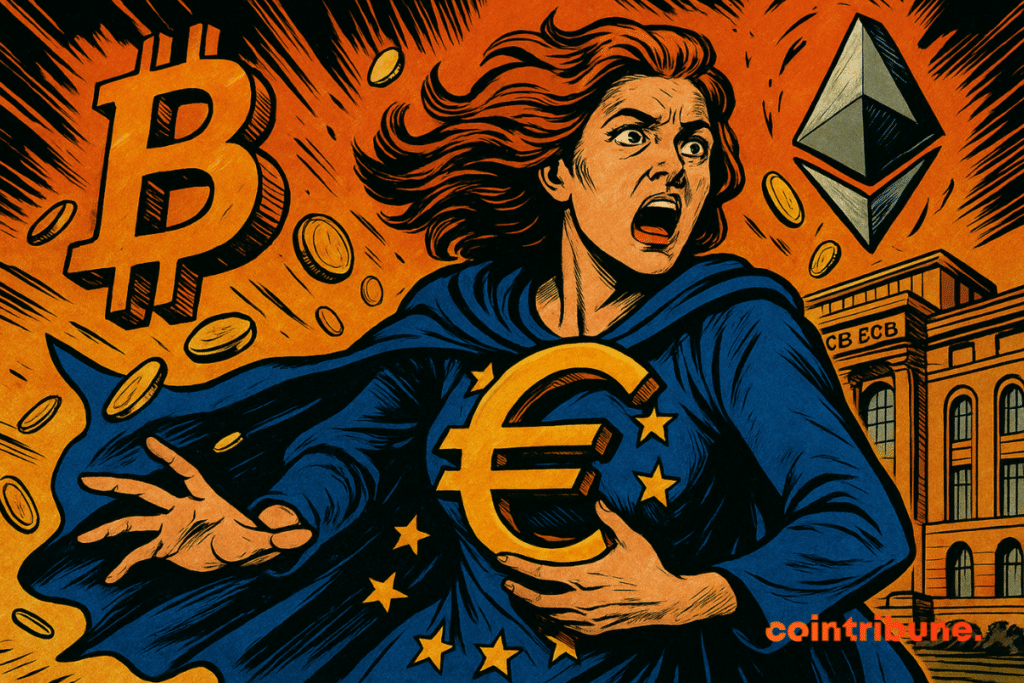ECB Warns: Europe’s Monetary Sovereignty Threatened by Crypto
The European Central Bank no longer harbors illusions: the digital euro alone will not be enough to preserve the Union’s monetary sovereignty in the face of the rise of dollar stablecoins. In a statement both clear-sighted and concerning, advisor Jürgen Schaaf suggests a strategic shift. The solution may not come from the ECB itself, but rather from the private crypto ecosystem, which is much more responsive.

In Brief
- The ECB warns: the rise of cryptos threatens Europe’s monetary control.
- Bitcoin and Ethereum challenge the euro’s authority on the continent.
- Towards a loss of financial sovereignty? Europe under pressure from cryptos.
Dollar stablecoins, a tidal wave ignored for too long
The numbers speak for themselves: the majority of global crypto transactions rely on dollar-backed stablecoins, such as USDT, which has just hit a new record, or USDC. This phenomenon grants disproportionate monetary influence to the United States, well beyond its borders. Europe, on its side, is slow to impose credible alternatives denominated in euros.
Jürgen Schaaf does not mince words: despite the existence of a regulatory framework like MiCA (Markets in Crypto-Assets), euro stablecoins are struggling to take off. Their adoption remains marginal, hindered by a lack of technological attractiveness and the absence of a truly structured ecosystem. European crypto, too cautious, too slow, too institutional, struggles to establish itself.
Even worse, American regulation, embodied by the GENIUS Act, seems to have taken a clear lead. While Europe is still adjusting its texts, the United States is exporting its currency on a large scale thanks to blockchain. The result is unequivocal: a real loss of monetary influence for the European Union.
A broader crypto strategy: between digital euro, DLT and private innovation
Faced with this observation, Schaaf does not advocate a technocratic retreat. He rather calls for a profound rethinking of European strategy. Crypto can no longer rely solely on a central bank digital currency. A more open, more flexible, more collaborative vision must be adopted.
In an article published on the ECB’s website and taken up by Cointelegraph, the advisor emphasizes that the digital euro alone will not be enough to contain the rise of stablecoins backed by the dollar.
In this broader approach, euro stablecoins, provided they are well regulated, become a primary strategic lever. Driven by private initiative but subjected to strict regulation, these assets could meet market needs while restoring weight to the euro in the crypto universe.
The second pillar of this strategy rests on leveraging Distributed Ledger Technology (DLT), capable of modernizing large-value payments and optimizing cross-border transfers. At this stage, innovation at the infrastructure level becomes as crucial as monetary issuance itself.
The urgency of a coordinated and ambitious response
But this strategy will only work if it moves beyond a fragmented approach. Jürgen Schaaf stresses the necessity of international coordination to avoid disparities in rules and practices.
Europe must speak with one voice, not only towards the United States, which has just adopted three major laws likely to reshuffle the deck, but also towards the private giants of Web3.
Monetary sovereignty, long considered strictly a state issue, is now closely linked to the evolution of the crypto sector. Ignoring this would mean eventually accepting the gradual disappearance of the euro in digital use.
In this perspective, the ECB finally seems willing to consider what many actors in the crypto ecosystem have been calling for years: cooperation between the public sector and private innovation, within a framework that is both strict and open. Because in the era of decentralized currency, sovereignty is no longer written only in treaties; it is also inscribed in code.
Maximize your Cointribune experience with our "Read to Earn" program! For every article you read, earn points and access exclusive rewards. Sign up now and start earning benefits.

Fascinated by Bitcoin since 2017, Evariste has continuously researched the subject. While his initial interest was in trading, he now actively seeks to understand all advances centered on cryptocurrencies. As an editor, he strives to consistently deliver high-quality work that reflects the state of the sector as a whole.
The views, thoughts, and opinions expressed in this article belong solely to the author, and should not be taken as investment advice. Do your own research before taking any investment decisions.